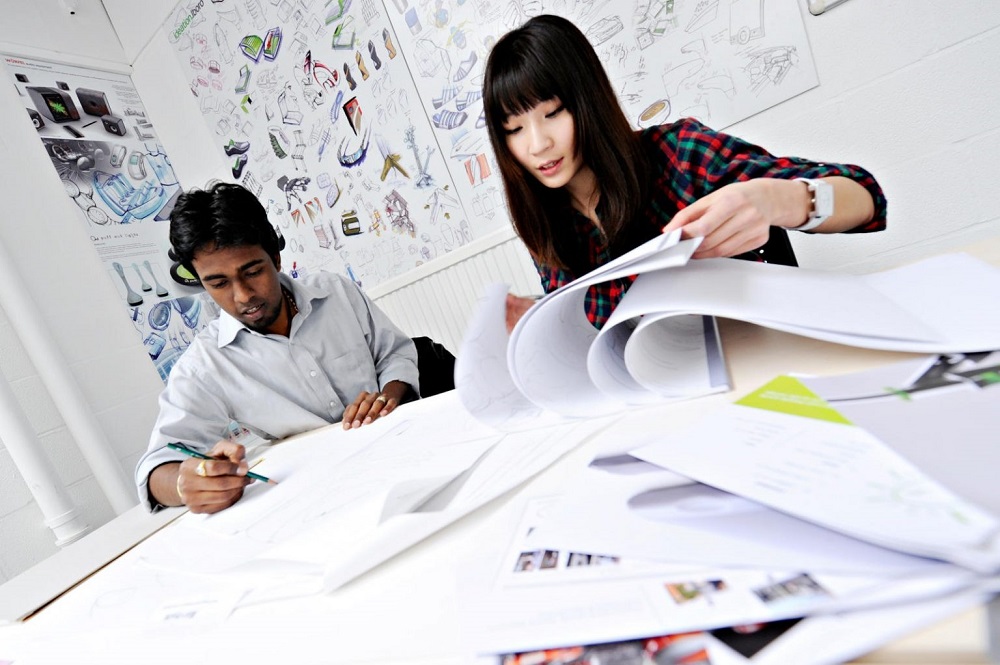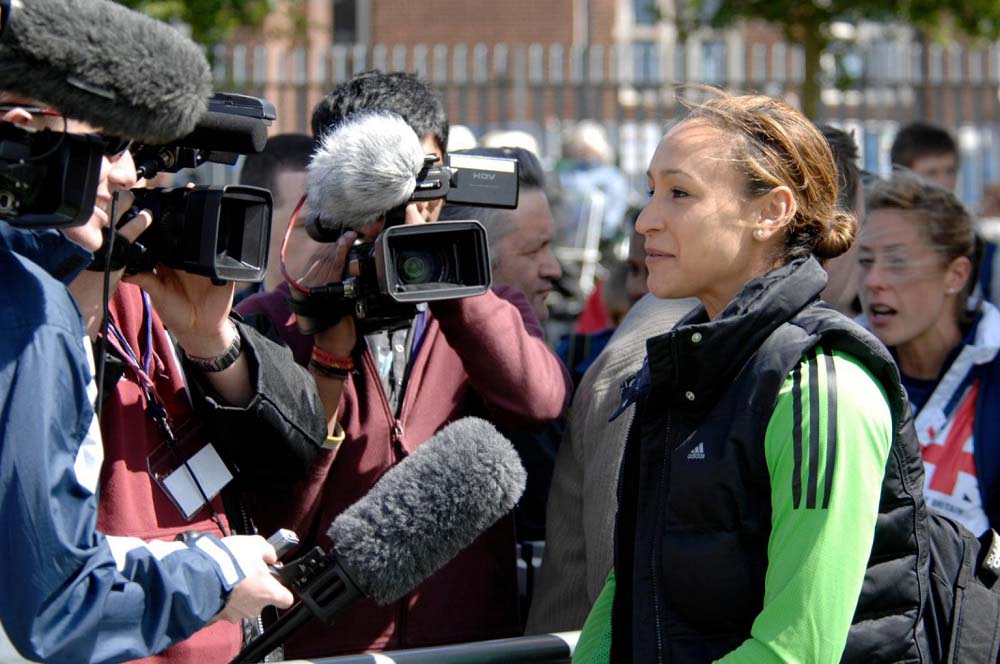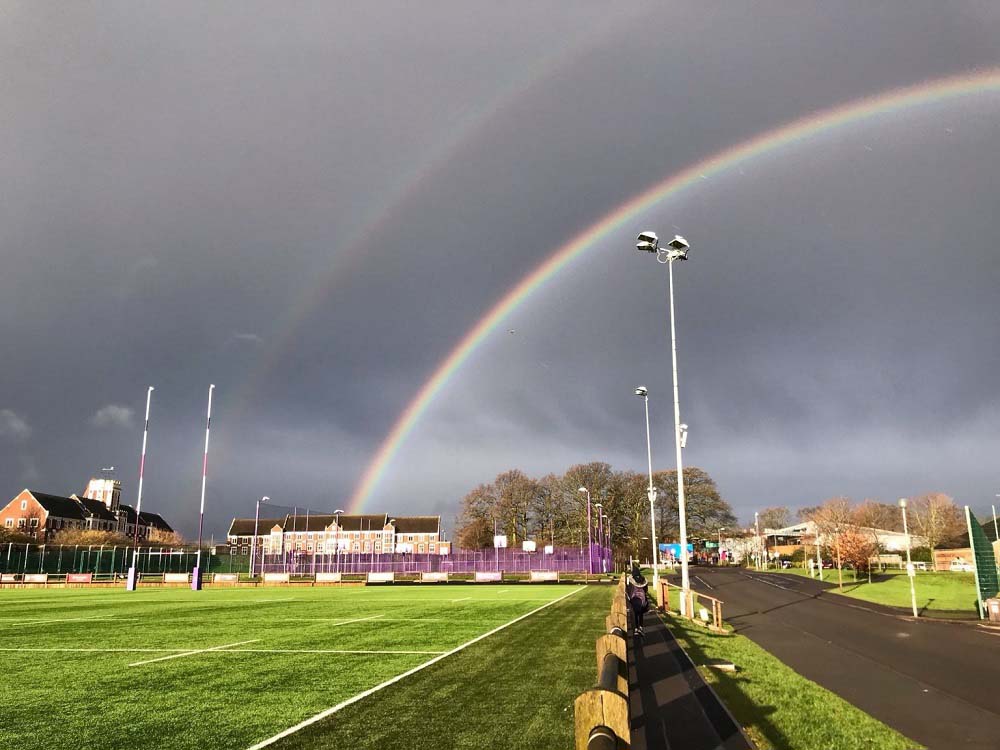Top portfolio and interview tips
Lewis, Product Design and Technology BSc
I’m Lewis, a second-year student studying BSc Product Design & Technology here at Loughborough University. My course is based in the school of design & creative arts and, as with many other design related courses, I had to create a portfolio of work for my application. Creating a portfolio was an exciting opportunity to present my best work in order to show Loughborough University that I was suitable for a place on the programme.
 That's me!
That's me!
However, the portfolio only tells part of your personal story. In order to get to know you better, you may also be invited to attend an interview. My interview was a fantastic opportunity to speak with an academic member of staff about my work and get to know more about the course too. Here I’ll cover some top tips for an effective design portfolio and how to impress your interviewer.
1. Do your research
Before anything else, it is vital that you do some initial research. For subjects such as design and engineering, there are multiple different disciplines that you can study. You may have a specific discipline you want to study or a general idea of some of the courses that are appropriate to you. It is vital that you do your research to ensure that you have applied for a course that is relevant to your skill set and you will enjoy.
Once you have decided on a discipline, do some more detailed research to inform your application and portfolio. A good starting point is the course information on the university website – this will give you an idea of the sorts of things you will study. You can use this as a prompt look at current industry trends, publications, videos and exhibits that are relevant to your chosen course area. By understanding the industry that you aspire to be part of, you can tailor your application and portfolio so that they are relevant.
2. Create a strong portfolio
Creating a portfolio at an early stage in your career can be a challenge. Hopefully, your initial research will have given you some idea as to what other people in industry are doing and how they present their work. GCSE and A Level work that you are proud of is always good to include. Take opportunities to work on projects outside of school to enhance your skills – you could create a personal project or do some work for local companies. Including extra work in your portfolio that you have done in your own time will showcase your skills even more and make your passion for the subject clear.
A strong portfolio should contain around 4 projects that showcase a variety of skills – my portfolio included a GCSE project, 2 A Level projects and some designs that I worked on with an external client. The focus of your portfolio should be the quality of work that you include, make sure that you are proud of what you put in it! Try to showcase a variety of skills in the work you include. For example, in a product design portfolio, you may wish to showcase evidence of:
- Concept and ideation sketches
- Presentation sketches
- CAD models
- Digital renders
- Early prototypes
- Final models
- User testing
Think carefully about the presentation and layout of your portfolio – try to maintain a consistent aesthetic across all of the pages. Above all else, enjoy making your portfolio. It’s a great experience to collate all of your best work and think creatively!
Loughborough’s Design School has created a portfolio guidance document to try and demystify the topic and offer straight forward advice on how to produce the best portfolio possible. This resource can be found here.
 Your portfolio says a lot about you to potential universities
Your portfolio says a lot about you to potential universities
3. Familiarise yourself with your application
If you happen to be applying for a Design course at Loughborough, now that you’ve applied for your course and submitted a great portfolio, you’re done! The application process for Design courses at Loughborough no longer requires an interview, so all you have to do now is wait for the reply and try and distract yourself by focussing on your current studies.
But if you’re applying to a university (or for another course at Loughborough) that does require an interview, your journey isn’t over, so read on for some more top tips!
Most university interviews for design subjects will be relatively informal. Therefore, the conversation will be influenced by your portfolio and what you have written in your UCAS personal statement. A good way to prepare for the interview is to reread your personal statement as you may be asked to explain something you said in greater detail. Also look through your portfolio, carefully considering why you have included the chosen work. Reflect on the details of the projects and the decisions you have made so that you can talk confidently about your work. It is also a good idea to revisit the course prospectus and any material the university have sent you to ensure you can answer course specific questions.
4. Practice, practice, practice!
The interview is getting closer, it’s time to practice what you will say. The best way to do this is to search online for commonly asked questions. Such questions typically include ‘why do you want to study on this course?’ and ‘what makes you suitable for this course?’. Once you have an idea of the types of questions you will be asked, get family or friends to undertake a mock interview with you. This will give you chance to practice your answers and articulate how you might phrase them. Also get people to view your portfolio and ask questions about your work to get yourself used to discussing your ideas.
 You have to become a pro at coherently expressing yourself
You have to become a pro at coherently expressing yourself
It is worth noting that many interviewers may ask questions to understand your chosen subject and interests. For design courses these sorts of questions can include ‘what is your favourite product?’, ‘what designers are you influenced by?’ or ‘what is your favourite design style?’. The chances are you will instinctively have answers to these questions but if you don’t then it is worth thinking about how you might answer them. In my interview I got asked what my favourite design was and why. I’m a big classic car fan so my answer was the original mini as, at the time, it was a revolutionary small car that had a unique design language. Your answers to these sorts of questions should show your subject passion and the areas of design that you are most interested in.
5. Get Organised
Before attending your interview, you must be as organised as possible. You need to ensure that you have the correct details and timings to attend the event. If you are required to take a hard copy of your portfolio then ensure that you have printed it and have it in an appropriate folder. Check any emails you have received and prepare any other documents that you may be required to bring with you. You also need to plan your journey and book appropriate accommodation if you need to stay near the university overnight. By organising yourself well beforehand, you will have peace of mind that everything will run as smoothly as possible on the interview day.
6. Dress appropriately
It is vital that you dress appropriately for an interview. You may receive guidance on the dress code from the university. If they don’t issue you with guidance, then I’d recommend dressing in something smart that you feel comfortable in. It is important that you are comfortable so you can focus properly on the interview. I was also offered a tour of the design school facilities after my interview. I therefore recommend wearing footwear that is appropriate for walking in should you attend a tour or workshop afterwards. For my interview I wore trousers, a shirt and a pair of smart shoes.
7. Arriving on campus
On the day, you should arrive on campus earlier than your set interview time. Getting there early will give you some time to relax before the interview and ensure you don’t have to rush. Remember – it’s better to be early than to be late! You should aim to get to the building where your interview will take place around 15 minutes early. By planning your journey and familiarising yourself with the campus map beforehand this should be easy to do. Also ensure that you have any contact details supplied by the university should you need to speak to someone if you get lost.
 The amazing Loughborough campus after a shower
The amazing Loughborough campus after a shower
8. The interview
Whilst the things you say in the interview are important, you also need to think about the impression you make with your body language. Sit up straight in the interview and make eye contact with the interviewer when speaking. This will make a good impression and show that you are confident. Positively engage with them and listen carefully to the questions they ask so you can respond appropriately. When speaking to them, show your enthusiasm for the subject and be confident when speaking about your portfolio work. Your interview is a great opportunity to find out more about the course – ask questions to find out more about the modules and teaching methods. The interview will take an informal conversational structure. This makes it easier for you to contribute to the discussion and ask questions.
Loughborough’s School, College and Liaison team has a dedicated webpage all about preparing for university interviews here.
9. After the Interview
When the interview is over you still need to remain professional. Thank the interviewer for their time and act responsibly at all times when on campus. You could be asked to attend a presentation or tour afterwards so be prepared to do this. If there are other members of staff at the event, you could also consider speaking them to find out more about the course.
10. Reflection
When your interview is over then it is a good idea to reflect upon the experience afterwards. You can think about what went well and what you could improve upon for future interviews in your career. If you need to attend interviews for other courses, then it would be beneficial to write down any questions that you were asked which caught you by surprise. Doing this will help you better prepare for these types of questions if they come up again in the future.